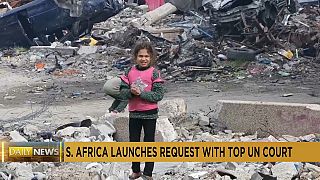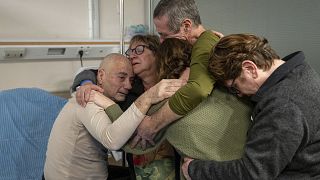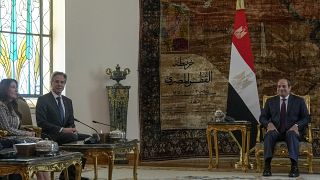Talks / negotiations
The ongoing Operation Swords of Iron which is conducted in Gaza has now killed over 28,000 Palestinians.
Israel says its troops recover every day, weapons, grenades and combat documents belonging to Hamas militants.
While an assault on Rafah, in southern Gaza looms, negotiations for a ceasefire resumed in Cairo Tuesday (Feb. 13).
Israel, Hamas, the US, Qatar,out and Egypt are involved in the talks which reportedly focused on the conditions for trading hostages for Palestinian prisoners.
Speaking in New York Tuesday (Feb. 13), the UN chief hoped for a deal to avoid devastating consequences.
"My sincere hope is that negotiations for the release of hostages and some form of cessation of hostilities to be successful to avoid an all-out offensive over Rafah, where the core of the humanitarian system is located and that would have devastating consequences," Antonio Guterres said.
Flooding tunnels
More footage from Israeli military shows underground tunnels allegedly used by a Hamas leader.
The Palestinian militant group has previously acknowledged building hundreds of kilometres of tunnels across Gaza.
Israel accuses Hamas of using these tunnels to move fighters and weapons across the territory.
The Israeli Defence Forces confirmed on January 30th that its troops were pumping seawater into a network of tunnels in the besieged Palestinian enclave.
In December, the United Nations Human Rights office warned that the "flooding" "with saltwater could have severe adverse human rights impacts, some long term."
Adding on a statement published on X formerly Twitter that "goods indispensable to civilian survival could also be at risk, as well as widespread, long-term & severe environmental damage. Civilians must be protected."
While the fate of Rafah hangs in the balance a refugee camp in central Gaza was reportedly bombed and reduced to rubble Wednesday (Feb. 14).
Israel promises to evacuate civilians if it does mount a ground offensive in Rafah. So far, no plan has been provided.
On Sunday (Feb. 11), the White House said President Joe Biden had warned Prime Minister Benjamin Netanyahu that Israel should not conduct a military operation against Hamas in Rafah without a “credible and executable” plan to protect civilians.
On Monday (Feb. 12), Biden met with Jordan’s King Abdullah II to the White House for talks on how to end the months-long war and plan for what comes afterward.
The meeting with Abdullah came as Biden and his aides were working to broker another pause in Israel’s war in Gaza in order to send humanitarian aid and supplies into the region and get hostages out. The White House faces growing criticism from some Americans over the administration’s continued support for Israel in the face of rising casualties in Gaza since Hamas launched its Oct 7 attack on Israel.
“The key elements of the deal are on the table,” Biden said alongside the king, though “there are gaps that remain.”
The French presidency said Wednesday (Feb. 14) in a statement that President Emmanuel Macron, in a phone call with Israeli Prime Minister Benjamin Netanyahu, had expressed his firm opposition to a possible Israeli military offensive in Rafah.













01:00
Hamas gives 'positive' response to 60-day ceasefire proposal but says talks needed on implementation
01:05
Ethiopia's mega-dam on the Nile is "now complete", Prime Minister says
01:55
US contractors say colleagues fired live ammunition at Palestinians seeking food
01:30
Foreign Ministers of Oman and Egypt urge Washington and Tehran to resume negotiations
01:04
Israeli airstrike on popular Gaza City beach café kills at least 30
01:30
Trump calls for a Gaza ceasefire deal as some Palestinians are skeptical